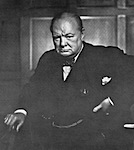 I expect that the Battle of Britain is about to begin. Upon this battle depends the survival of Christian civilization. Upon it depends our own British life, and the long continuity of our institutions and our Empire. The whole fury and might of the enemy must very soon be turned on us.
I expect that the Battle of Britain is about to begin. Upon this battle depends the survival of Christian civilization. Upon it depends our own British life, and the long continuity of our institutions and our Empire. The whole fury and might of the enemy must very soon be turned on us.
Hitler knows that he will have to break us in this Island or lose the war. If we can stand up to him, all Europe may be free and the life of the world may move forward into broad, sunlit uplands. But if we fail, then the whole world, including the United States, including all that we have known and cared for, will sink into the abyss of a new Dark Age made more sinister, and perhaps more protracted, by the lights of perverted science.
Let us therefore brace ourselves to our duties, and so bear ourselves that if the British Empire and its Commonwealth last for a thousand years, men will still say, ‘This was their finest hour.’
In 1940, Winston Churchill applied what David Cooperrider calls the power of “appreciative inquiry” and thereby awakened in the British a self-concept that had long lay dormant. Isaiah Berlin says of Churchill:
“He created a heroic mood and turned the fortunes of the Battle of Britain not by catching the mood of his surroundings but by being impervious to it, as he had been to so many of the passing shades and tones.”
Appreciative Inquiry (AI) is a an approach to organizational change based on the ability to generate images that affirm the forces that give life and energy to a system. In part, AI rests on a postmodern notion that humans construct their own reality. Truth is obviously not socially constructed, but divinely constructed. Yet, the tools of AI can help the movement leader identify the good gifts God has placed in an community/organization and dream how to use those gifts to fix what is wrong. For example, the “appreciative approach” doesn’t focus on what’s broken or decaying, but on what’s working and life giving. It creates hope.
As AI’s leading theorist, David Cooperrider says, Churchill’s ability to create hope in 1940 arose from his ability to see what others don’t see:
“Churchill’s impact was the result of his towering ability to cognitively dissociate all seeming impossibilities, deficiencies, and imperfections from a given situation, and to see in his people and country that which had fundamental value and strength. His optimism, even in Britain’s darkest moment, came not from a Pollyanna-like sense that ‘everything was just fine,’ but from a conviction that was born from what he, like few others, could actually see in his country.”
Movement leaders help move others toward a preferred future, one which grows from our choosing to see the best. In the images they use, leaders can pull others to a desired future — to help their movements/organizations be called to “their finest hours.” Words create worlds; images of a preferred future have heliotropical energy–they cause us like plants to lean toward the light.
As David Cooperrider suggests, we’re always putting those images out there, anticipating the future, prophesizing what will happen. We are anticipatory beings. It is this power of expectation that pulls us toward future reality.
Or as Jesus said over and over, the kingdom of God is like >>>>
As you think about your movement, have you put your preferred future into a picture, a vision — one that is so vivid, so real, so magnetic that it energizes others?
Leave a Reply